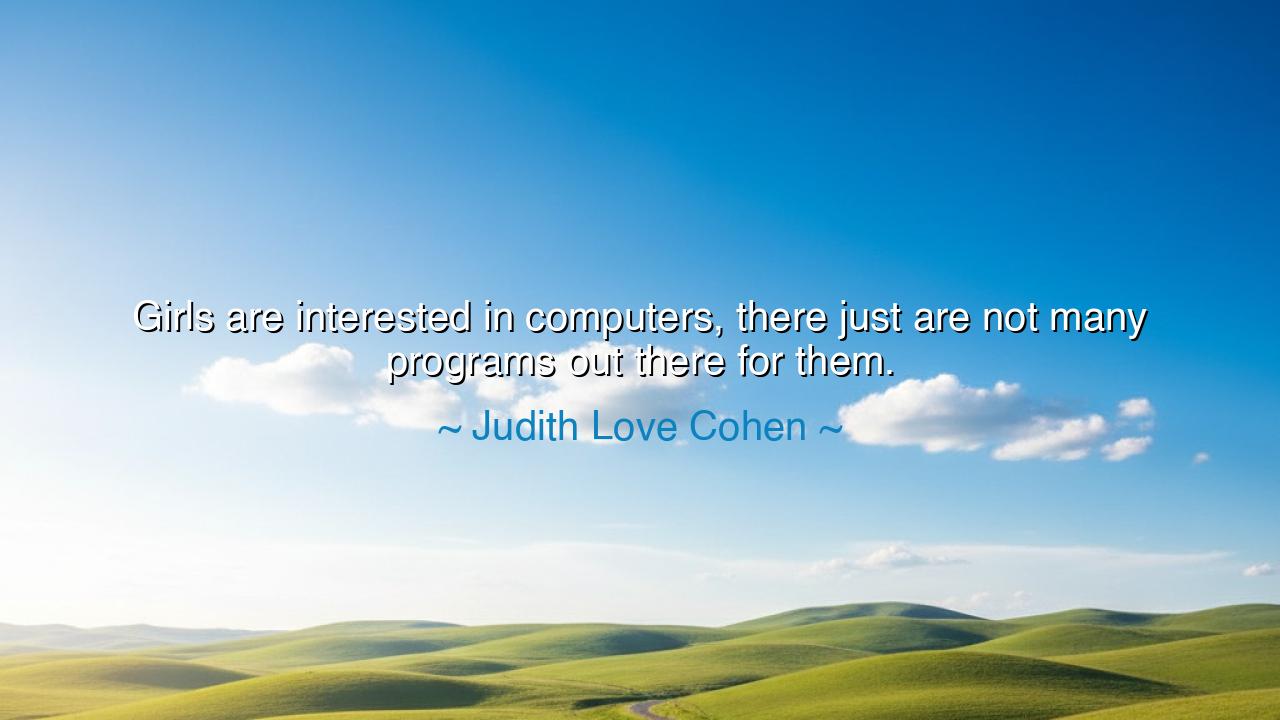
Girls are interested in computers, there just are not many
Girls are interested in computers, there just are not many programs out there for them.






Listen, O children of the earth, and hear the wisdom of Judith Love Cohen, who spoke a truth about potential and opportunity: "Girls are interested in computers, there just are not many programs out there for them." These words are a recognition of the untapped potential that lies in the hearts and minds of young girls, and a call to action—a call to create spaces, opportunities, and programs where that potential can be nurtured and allowed to flourish. Cohen’s words echo a deep truth about the power of inclusivity and opportunity, and they highlight the barriers that have historically stood between women and technology.
In the ancient world, the role of women in intellectual pursuits was often limited by societal norms, but there were always exceptions. Hypatia of Alexandria, one of the greatest mathematicians and philosophers of her time, defied the conventions of her era. Hypatia taught and wrote about astronomy, geometry, and philosophy, her intellect shining brightly in a world that often relegated women to more subservient roles. She was a pioneer, much like the women of today who are breaking into fields like technology and science, fields where they have long been underrepresented. Like Cohen’s statement, Hypatia’s life reminds us that talent and interest know no gender, and the limitations placed upon women by society are often arbitrary and restrictive.
Consider the story of Ada Lovelace, the daughter of the poet Lord Byron, who is often credited as the first computer programmer. In a time when women were not expected to participate in fields of science and mathematics, Ada defied expectations. She saw potential in the analytical engine designed by Charles Babbage and was able to envision algorithms that would later be used to program computers. Lovelace’s work laid the foundation for the very technology that would shape the modern world, proving that women have always had a deep interest and capacity for the technological advancements of their time. Cohen’s words echo this sentiment: the interest is there, but the pathways for women to explore and contribute in these fields have historically been lacking.
The barriers that Cohen refers to are not merely physical or intellectual but societal and cultural. Girls have long been discouraged from pursuing careers in fields like computing and engineering, often because of outdated ideas about what women are capable of. These limitations, though slowly being dismantled, still persist in many areas of the world. Yet, like the great women of the past, young girls today are beginning to see that they are just as capable of mastering computers, mathematics, and engineering as their male counterparts. The programs, the mentorships, and the communities are starting to take shape, but there is still much work to be done to create equal opportunities for all.
The lesson here, O children of the earth, is one of empowerment and possibility. Cohen’s statement challenges us to not only recognize the interest that girls have in technology but also to actively create avenues for them to explore these interests. It is not enough to simply believe in the potential of women—we must also actively build the structures that allow them to reach that potential. If the programs are not yet in place, it is up to each of us to create them, to build a world where talent and interest are not defined by gender, but by the limitless potential of the human spirit.
In your own lives, O seekers of wisdom, remember that the power to shape the future lies in the actions we take today. If you are a creator, build systems that allow girls to explore technology without barriers. If you are a mentor, offer guidance and encouragement to those who may doubt their own capabilities. If you are a parent, raise your children in a world where all dreams are possible, where there are no limits to what they can achieve based on their gender. Together, we can create a world where the next generation of women can thrive in the fields of science, technology, engineering, and mathematics, where there are no limits to their potential.
Remember this, O children of the earth: the world is shaped by those who create, and there is no room for limitations based on outdated beliefs. Let us all work together to create a future where girls are not just interested in computers, but where they are leading the charge, innovating the future, and transforming the world. In this, we will honor the legacy of the women who came before us and pave the way for those who will follow.






AAdministratorAdministrator
Welcome, honored guests. Please leave a comment, we will respond soon